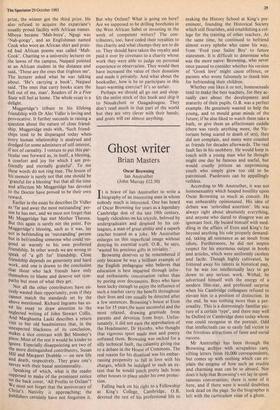Ghost writer
Brian Masters
Oscar Browning Ian Anstruther (John Murray £12.50) t is brave of Ian Anstruther to write a biography of an interesting man in whom nobody much is interested. One has heard of Oscar Browning for years as a legendary Cambridge don of the late 19th century, hugely ridiculous on his tricycle, beloved by undergraduates and despised by his col- leagues, a man of great ability and a superb teacher treated as a joke. Mr Anstruther enlarges on this superficial image without denying its essential truth. 0.B., he says, 'wasted his precious gifts in triviality.'
Browning deserves to be remembered if only because he was a brilliant example of the English pedagogue who believes that education is best imparted through infor- mal enthusiastic conversation rather than by poring over documents. Boys who have been lucky enough to enjoy the influence of such a teacher carry the benefit throughout their lives and can usually be detected after a few sentences. Browning's house at Eton was for 15 years the most successful and the most relaxed, drawing gratitude from parents and devotion from boys. Unfor- tunately, it did not earn the approbation of the Headmaster, Dr Hornby, who thought that vigorous sport made men and poetry softened them. Browning was sacked for a silly technical fault, the calamity giving rise to a debate in the House of Commons. The real reason for his dismissal was his embar- rassing propensity to fall in love with his charges, which he indulged to such an ex- tent that he would pinch pretty lads from other houses to place under his own protec- tion.
Falling back on his right to a Fellowship at King's College, Cambridge, O.B. devoted the rest of his professional life to making the History School at King's pre- eminent, founding the Historical Society which still flourishes, and establishing a col- lege for the training of other teachers. At the same time, he continued to befriend almost every ephebe who came his way, from 'Fred your Sailor Boy' to future statesmen. It is difficult to determine who was the more naive: Browning, who never once paused to consider whether his version of 'Greek love' might cause offence, or parents who wrote fulsomely to thank him for befriending their children.
Whether one likes it or not, homosexuals tend to make the best teachers, for they ac- tually care about the development and maturity of their pupils. O.B. was a perfect example. He genuinely wanted to help the young, and to mould great minds of the future; if he also liked to watch them take a bath, or give them an affectionate cuddle (there was rarely anything more, the Vic- torians being scared to death of sex), they did not complain, and many were counted as friends for decades afterwards. The real fault lies in his snobbery. He would keep in touch with a young man who he thought might one day be famous and useful, but would cruelly jettison an unpromising youth who simply grew too old to be patronised. Paederasts can be appallingly ruthless.
According to Mr Anstruther, it was not homosexuality which heaped hostility upon Oscar Browning so much as conceit. He was unbearably opinionated. His idea of debate was 'unbridled assertion'. He was always right about absolutely everything, and anyone who dared to disagree was an ignorant fool. He busied himself with med- dling in the affairs of Eton and King's far beyond anything his role properly demand- ed, taking all resistance as an insult from idiots. Furthermore, he did not inspire respect for his enormous output in books and articles, which were uniformly careless and facile. Though highly cultivated, he frittered away his talents in historical pap, for he was too intellectually lazy to get down to any serious work. Withal, he advertised himself with the energy of a modern film-star, and professed surprise when his Cambridge colleagues refused to elevate him to a position of distinction. In the end, he was nothing more than a per- sonality. This is a distressingly familiar pic- ture of a certain 'type', and there may well be Oxford or Cambridge dons today whom one could recognise in the portrait. Odd that intellectuals can so easily fall victim to the frivolous attractions of fame and social success.
Mr Anstruther has been through the Browning archive with scrupulous care, sifting letters from 10,000 correspondents, but comes up with nothing which can ex- plain the enigma of how such an erudite and charming man can be so absurd. Nor does it help that Browning's wit lay in spon- taneous conversation; there is none of it here, and if there were it would doubtless look dead on the page. So the biographer is left with the curriculum vitae of a ghost.














































 Previous page
Previous page